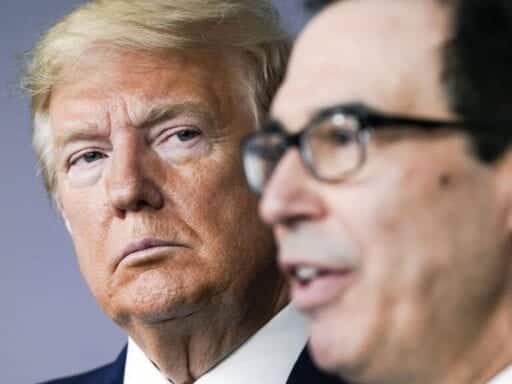This could be the first time in history that we fight a recession with truly unrestricted cash.
In the clearest sign yet that the White House is interested in sending out unrestricted cash to help Americans pay the bills amid a shutdown of much of the economy, Treasury Secretary Steve Mnuchin told reporters during a White House briefing that “we are looking at sending checks to Americans immediately.”
“Americans need to get cash now and the president wants to get cash now, and I mean now— in the next two weeks,” Mnuchin said Tuesday.
President Donald Trump, who was conducting the briefing with Mnuchin, added that he wants to “go big” — to not have to go back to Congress repeatedly for additional stimulus measures, but enact a big measure at once.
It was not immediately obvious as of the briefing what form this cash plan would take. At one point, Mnuchin appeared to connect the idea to his and Trump’s proposal for a payroll tax holiday to combat the coronavirus. “Payroll tax is one way [to get cash out],” he said. “It comes over a period of months. We want to do something faster. We have a way of getting money out quickly and accurately.”
The implication is that this method will be faster and more direct than a payroll tax cut, but beyond that, we’re short on details. And those details really matter.
A payroll tax cut, for instance, only benefits people currently working, does nothing for people who’ve been laid off or for hourly workers, and, as Mnuchin suggested, moves slowly. An unrestricted cash check of, say, $1,000 to every American adult, as Sen. Mitt Romney (R-UT) has proposed, would also benefit people out of work, those on fixed incomes or living on disability or retirement benefits, and so on.
/cdn.vox-cdn.com/uploads/chorus_asset/file/19813626/AP_20077571829439.jpg) Evan Vucci/AP
Evan Vucci/APWe don’t know yet if Trump and Mnuchin’s plan will be similarly unrestricted, or even what size it will be. Mnuchin hinted that the checks could be bigger than $1,000 but did not clarify if every American adult, or every adult and child, or every adult and child below a certain income threshold, would get the benefit.
He did say, “We don’t need to send people who make a million dollars a year checks,” implying that the checks will be means-tested to some degree.
But if the cash is genuinely unrestricted, it would be a historic move. While Americans received checks as part of the response to recessions in 2001 and 2008, those were sent out as rebates or refunds to taxpayers. Never before have all Americans, regardless of income, and including the poorest citizens who do not earn enough money to have positive income tax burdens, gotten checks.
The case for cash now, and plans for it
Economists on the left and right have been pushing for cash as a coronavirus response over the past several days. Harvard economist Greg Mankiw, who served as chief economist to President George W. Bush, has argued that cash payments are needed not so much to stimulate the economy as to help people whose jobs are impossible to perform due to social distancing. It’s a humanitarian measure, not a stimulus measure.
“Financial planners tell people to have six months of living expenses in an emergency fund. Sadly, many people do not,” Mankiw writes on his blog. “Considering the difficulty of identifying the truly needy and the problems inherent in trying to do so, sending every American a $1,000 check asap would be a good start. A payroll tax cut makes little sense in this circumstance, because it does nothing for those who can’t work.”
Romney’s bill, offering $1,000 per American, gained considerable attention, but it is not the only congressional plan offering cash. Democratic Reps. Tim Ryan and Ro Khanna proposed giving at least $1,000 to every American making under $65,000, and as much as $6,000 to some families with children.
The boldest plan comes from Sens. Michael Bennet (D-CO), Cory Booker (D-NJ), and Sherrod Brown (D-OH). Joined by colleagues Sens. Angus King (I-ME), Chris Murphy (D-CT), and Brian Schatz (D-HI), they have called for immediate $2,000 payments to all adults and children in the US below a certain income threshold ($90,000 for singles and $180,000 for couples is one number I’ve heard floated in Congress).
If the US is still in a public health emergency in July, Americans would get another $1,500 each. If the same is true in October, another $1,000 in checks would go out. If the public health emergency is over but unemployment has increased by a single point, the checks still go out. If unemployment rises by half a point, checks half the size go out.
We will have to wait and see how bold Trump and Mnuchin go with their cash plan. But there is now a broad, bipartisan consensus that we need cash immediately.
Author: Dylan Matthews
Read More



